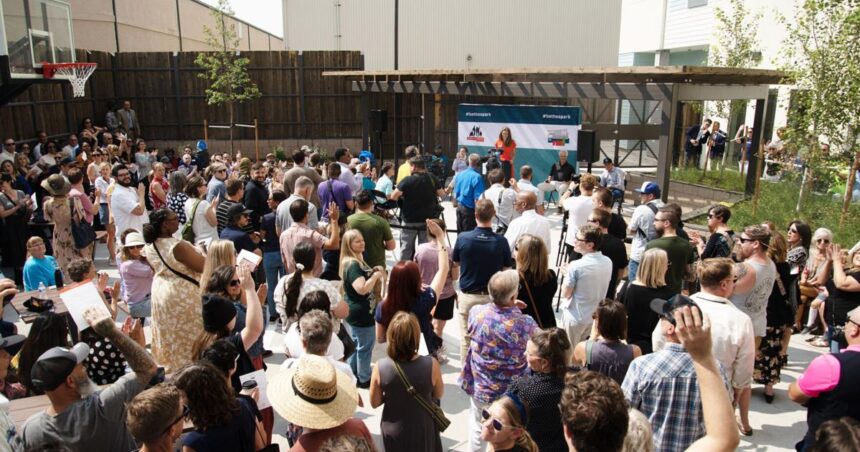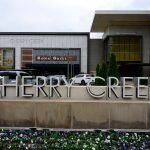A long-awaited project to reduce youth homelessness came to fruition on Wednesday as Denver nonprofit Urban Peak opened its $38 million, 136-bed homeless shelter.
The shelter, dubbed the “Mothership Campus,” serves homeless people ages 12 to 24.
“I am so overwhelmed by this moment,” Urban Peak CEO Christina Carlson told the Denver Gazette on the shelter’s new fourth floor balcony overlooking downtown Denver’s skyline. “But it’s not the most important moment. The most important moment is when the youth walk through the door.”
Urban Peak is a service provider focused on youth homelessness. Carlson describes the Mothership Campus as a “trauma informed” care center exclusively for youth struggling with homelessness.
Once a single-story shelter at 1630 S. Acoma St., the shelter now offers four floors of living units, case management and life skills courses.
Wednesday’s opening followed eight years of tedious planning, a result that nonprofit officials call a first-of-its-kind solution to curbing youth homelessness, doing so by “getting young people off the streets and out of a system that is built to support chronically homeless adults,” Urban Peak officials said in a statement.
“There’s nothing like it anywhere else in the country,” Carlson said, adding Urban Peaks now has “a space where people feel valued just walking through the door.”
“I think the piece around the trauma-informed design cannot be underscored enough,” Carlson said. “As we think about the work that our team does, it’s very hard, and emotional, and complicated.”
Marnie Cooke, a spokesperson for Urban Peak, added: “This structure is a first responder for youth experiencing a variety of traumatic experiences.”
Each of the four floors cater to certain ages and individual needs.
For instance, the middle floors feature dormitory rooms connected to what Urban Peak call six different “neighborhoods.” Those neighborhoods, assigned for specific groups of residents, are community rooms offering customized support services, case management, kitchens, life skills learning and community space for residents to interact.
One neighborhood caters to young dads or moms with children, while others adhere to certain age groups and individual needs, according to Cooke.
Different floors are designed to provide transitional space for residents “anywhere from six weeks to six years,” Cooke said.
Added amenities include a computer lab, art and music studios, a basketball hoop outside, a garden and two courtyard balconies on the top level. The first floor was remodeled to feature a full-service kitchen and cooking lessons, more community space and a large lobby area.
In a statement, Urban Peak officials described the old shelter as “fatigued.”
“Knowing what used to be here on these grounds, it is mind-blowing to see what stands before us today and the potential this new campus brings our organization,” said Urban Peak Youth Program Director Daniel Sparks.
The new facility, Sparks added, is “designed solely for the population that we serve, not just as a shelter, but a space to grow and develop. It’s an environment that feels good and enables us to provide an opportunity for youth to grow in a very sustainable way.”
The changes brought smiles to previous residents and employees of the former Urban Peaks shelter.
“When I was younger, this place helped me out a lot,” Brian Lang, an aspiring high school graduate and former resident of the old Urban Peak shelter, said while exploring the new facility.
“This is amazing,” Lang said, roaming the upgraded first-floor hallways he once called home.
Urban Peak has existed for 35 years. And, for all those years, Dick Thomas has served on the board of directors.
When asked what this project meant to the nonprofit, Thomas said, “There’ve been so many good people that worked toward this moment, and I didn’t think the moment would be this big.”
Of the roughly $38 million price tag, Denver ended up contributing $16.7 million toward the project. That money came from the city’s $260 million RISE Denver bond, which was approved by voters to fund what residents identify as important projects. The project also received federal and state help, as well as some donations.
An emotional Denver Mayor Mike Johnston spoke during Wednesday’s ribbon cutting ceremony.
“The Mothership is what love looks like in a physical form,” he said. “Every person in this city should feel proud that they own this, and should feel proud that they built this, because this is us at our best.”
Johnston added: “To every young person who is somewhere on the streets tonight, not knowing where they are going to go, where they are going to stay, or who’s going to care for them – there is a Mothership waiting for you.”











